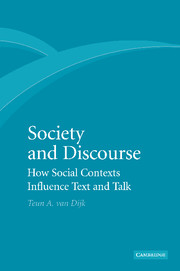6 - Conclusions
Published online by Cambridge University Press: 31 August 2009
Summary
In this chapter I shall only briefly list the major conclusions of this voluminous two-volume study, and finally formulate some open problems and tasks for the advancement of an integrated, multidisciplinary theory of context.
Necessity of a theory of context. After decades of studies focused, more or less autonomously, on text and talk itself, with occasional lip service being paid to the relevance of context, the time has come to develop an integrated theory of context and its relations to discourse. Such a theory should be related to context studies in other disciplines.
The term “context.” The term “context” is widely used in academic and other genres of discourse, generally in the rather vague sense of “environment” or “situation” and related notions. In the language sciences, “context” is also used as “verbal context” of some expression (word, sentence, etc.), that is, as “co-text.” In this study, “context” is defined as a theoretical term, within a broader theory of discourse, that must account for the ways discourses are produced and understood as a function of the properties of the communicative situation – as they are understood and represented by the participants themselves.
From context-free to context-sensitive scholarship. Many of the humanities and social sciences have shown a development in the last four decades away from autonomous approaches focusing on text, talk, communication, literature, cognition, etc. in their own right, towards more context-sensitive, dynamic, situated accounts of social phenomena. “Contextualism” is thus a general property of contemporary scholarship, extending also to philosophy and the sciences.
[…]
- Type
- Chapter
- Information
- Society and DiscourseHow Social Contexts Influence Text and Talk, pp. 248 - 255Publisher: Cambridge University PressPrint publication year: 2009



